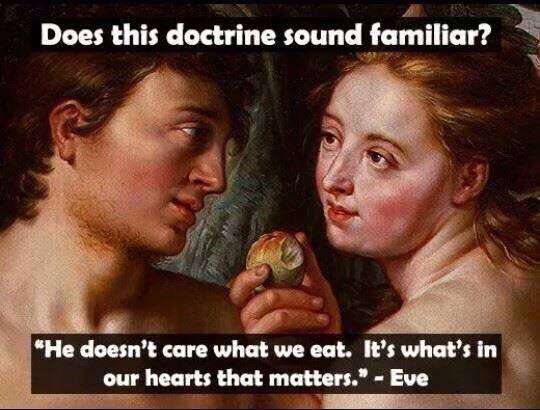A FaceBook friend shared this meme on FaceBook a couple of days ago, coupled with shouts of great confusion. He spent some time trying to track it down to its source, evidently successfully, but was still no wiser as to what the author was after. Me, I don’t care where it came from; it’s a meme, and needs to be taken as it is.
So we’ve got a picture of Eve making bedroom eyes with Adam after having just taken a bite from the fruit of the tree of good and evil. And Eve is quoted as saying, “He doesn’t care what we eat. It’s what’s in our hearts that matters.” Now, eating the fruit was clearly wrong, from a Biblical perspective; it got Adam and Eve and their sultry looks cast out of Eden. Thus, this pretty clearly reads as a rejection of Eve’s claim; apparently God does care what we eat. And then the superscript, “Does this doctrine sound familiar?”, is clearly something of a warning to the viewer: have you fallen a victim to this pernicious philosophy of Eve?
But in Mark 7:14-23 Jesus says,
14 And he called the people to him again, and said to them, “Hear me, all of you, and understand: 15 there is nothing outside a man which by going into him can defile him; but the things which come out of a man are what defile him.” 17 And when he had entered the house, and left the people, his disciples asked him about the parable. 18 And he said to them, “Then are you also without understanding? Do you not see that whatever goes into a man from outside cannot defile him, 19 since it enters, not his heart but his stomach, and so passes on?” (Thus he declared all foods clean.) 20 And he said, “What comes out of a man is what defiles a man. 21 For from within, out of the heart of man, come evil thoughts, fornication, theft, murder, adultery, 22 coveting, wickedness, deceit, licentiousness, envy, slander, pride, foolishness. 23 All these evil things come from within, and they defile a man.” (RSV-CE)
In short, Jesus says, God really does care what’s in our hearts rather than what we eat, and says so; and so it seems odd for a Christian to be promulgating a meme that says the opposite.
I don’t know how to cut through this riddle, but I’ve got a number of observations.
First of all, Jesus’ statement was about “unclean” foods; he declared that no food makes you unclean. Bug lovers are free to eat lobster, for example. But that’s different than saying that Jesus doesn’t care what we eat, for Jesus clearly cares about that a great deal: he cares that we not be gluttons, and he cares that we share what we have with the poor.
Second, the fault of Adam and Eve wasn’t in desiring the fruit; script tells us that Eve only ate it after she looked at it and saw that it was good for food. There was nothing unclean in the fruit; it was eminently desirable, and that it appeared so to Eve shows that her sense was in good working order. No, the problem wasn’t the fruit, as such, it was the disobedience—which is exactly what was in Eve’s heart. In fact, so far from excusing Eve’s transgression her statement convicts her: her heart, that is, her will, insisted on having its way despite God’s direct command to her.
And Jesus clearly cares very much about what’s in our hearts. In the Sermon on the Mount he tells us that willing a sin is as bad as carrying it out fully. Jesus’ insistence on the movements of the heart isn’t something that gets us off the hook; rather, it gets us more fully on it, and more clearly in need of forgiveness.
In short, the will, the movements of the human heart, are prior to all human action and drive it; and Jesus cares more about that than he does about the actions the ultimately result.
And so, circling back to the meme what I see is a failure of teaching. What Eve is likely intending to say is, “We can do what we like; our actions don’t matter, what matters is that we are good people and have warm feelings toward everyone. So long as we’re nice to people, God’s going to be happy.” The correct response is to distinguish between feelings and general I’m-a-good-person-ness on one hand, and the actual movements of the will on the other, and make it clear that it’s the latter that Jesus looks at. Eve’s statement could apply to either end of the spectrum, and simply rejecting it rejects the good understanding with the bad. And rejecting good understanding is never a good thing.
In short, the meme is a mess; and I’m at a loss to see just what good the author was trying to accomplish with it.













